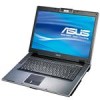Asus V1Jp V1J English Edition User''s Manual(E2579) - Page 24
Rear Side
 |
View all Asus V1Jp manuals
Add to My Manuals
Save this manual to your list of manuals |
Page 24 highlights
2 Knowing the Parts Power Station (Cont.) Rear Side 1 2 34 5 6 7 8 1 PS/2 Port The PS/2 port is for connection to either an external PS/2 mouse or an external PS/2 keyboard. 2 2.0 USB Port (2.0/1.1) The USB (Universal Serial Bus) port is compatible with USB 2.0 or USB 1.1 devices such as keyboards, pointing devices, cameras, hard disk drives, printers, and scanners connected in a series up to 12Mbits/sec (USB 1.1) and 480Mbits/sec (USB 2.0). USB allows many devices to run simultaneously on a single computer, with some peripherals acting as additional plug-in sites or hubs. USB supports hot-swapping of devices so that most peripherals can be connected or disconnected without restarting the computer. 3 Power (DC) Input (Power Station) The supplied power adapter converts AC power to DC power for use with this jack. Power supplied through this jack supplies power to the power station, Notebook PC, and charges the Notebook PC's battery pack. To The power station has its own power adapter. prevent damage to the power station, Notebook PC, and battery pack, always use the supplied power adapter. CAUTION: MAY BECOME WARM TO HOT WHEN IN USE. BE SURE NOT TO COVER THE ADAPTER AND KEEP IT AWAY FROM YOUR BODY. 4 LAN Port The RJ-45 LAN port with eight pins is larger than the RJ-11 modem port and supports a standard Ethernet cable for connection to a local network. The built-in connector allows convenient use without additional adapters. 5 Serial Port The 9-pin D-sub serial port supports native serial devices such as a serial drawing tablets, serial mouse, or serial modem. Serial devices have been slowly replaced by USB devices. 24















